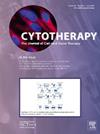人体T细胞短暂暴露于低氧、低温度、低pH值和低营养水平对细胞治疗应用的生物处理的影响。
IF 3.7
3区 医学
Q2 BIOTECHNOLOGY & APPLIED MICROBIOLOGY
引用次数: 0
摘要
背景:t细胞治疗的进步刺激了生物工艺的发展,以满足细胞治疗制造的特殊需求。在细胞浓缩洗涤过程中,细胞经常暴露于短暂的氧气、温度、pH值和营养水平降低的环境中。这些条件的持续时间较长可能是由工艺偏差引起的,或者,如果它们是无害的,可以用来简化实验和制造过程中工艺阶段的调度。方法:为了避免在生物加工过程中对T细胞质量产生不可预测的影响,我们测量了每mL 2.5亿个活化的人T细胞在4至37℃的温度下沉淀长达6小时所产生的这种环境暴露的影响。结果:葡萄糖浓度降至0.5 mM, pH降至6,乳酸浓度上升至55 mM。37°C的浓缩细胞条件导致活细胞数量损失最大,平均只有58%和41%的细胞在3和6 h后恢复。同样,即使在暴露仅3小时后,它们随后的细胞扩增培养也大幅减少,并且中枢记忆T细胞的百分比减少,效应记忆和效应T细胞的百分比增加。虽然在相似的环境条件下,在室温下,高浓度细胞的负面影响在长达3小时内大大减少。在4°C下,瞬时条件不那么极端,细胞可以很好地维持6小时。总的来说,当开发涉及浓缩细胞的t细胞治疗制造工艺和设备时,本研究的结果表明,更实际可行的室温可以使用长达3小时以获得高活细胞回收率,而如果需要更长时间的浓缩t细胞条件,则应使用较低的温度,如4°C。本文章由计算机程序翻译,如有差异,请以英文原文为准。
Impacts of transient exposure of human T cells to low oxygen, temperature, pH and nutrient levels relevant to bioprocessing for cell therapy applications
Background
T-cell therapy advances have stimulated the development of bioprocesses to address the specialized needs of cell therapy manufacturing. During concentrated cell washing, the cells are frequently exposed to transiently reduced oxygen, temperature, pH, and nutrient levels. Longer durations of these conditions can be caused by process deviations or, if they are not harmful, be used to ease the scheduling of process stages during experiments as well as manufacturing.
Methods
To avoid unpredictable impacts on T-cell quality during bioprocessing, we measured the influences of such environmental exposures generated by settling 250 million activated human T cells per mL, for up to 6 h at temperatures from 4 to 37°C.
Results
The measured glucose concentration decreased to as low as 0.5 mM and the pH to 6, while lactate increased up to 55 mM. The concentrated cell conditions at 37°C resulted in by far the greatest losses in viable cell numbers with, on average, only 58% and 41% of the cells recovered after 3 and 6 h, respectively. Likewise, their subsequent cell expansion cultures were substantially reduced even after only 3 h of exposure, and with decreased percentages of central memory T cells and increased percentages of effector memory and effector T cells. Although under similar environmental conditions at room temperatures, the negative impacts of high cell concentrations were greatly diminished for up to 3 h. At 4°C the transient conditions were less extreme, and the cells well maintained for 6 h.
Conclusions
Overall, when developing processes and devices for T-cell therapy manufacturing that involve concentrated cells, the results of this study indicate that more practically feasible room temperatures can be used for up to 3 h to obtain high viable cell recoveries whereas lower temperatures such as 4°C should be used if there is a need for more prolonged concentrated T-cell conditions.
求助全文
通过发布文献求助,成功后即可免费获取论文全文。
去求助
来源期刊

Cytotherapy
医学-生物工程与应用微生物
CiteScore
6.30
自引率
4.40%
发文量
683
审稿时长
49 days
期刊介绍:
The journal brings readers the latest developments in the fast moving field of cellular therapy in man. This includes cell therapy for cancer, immune disorders, inherited diseases, tissue repair and regenerative medicine. The journal covers the science, translational development and treatment with variety of cell types including hematopoietic stem cells, immune cells (dendritic cells, NK, cells, T cells, antigen presenting cells) mesenchymal stromal cells, adipose cells, nerve, muscle, vascular and endothelial cells, and induced pluripotential stem cells. We also welcome manuscripts on subcellular derivatives such as exosomes. A specific focus is on translational research that brings cell therapy to the clinic. Cytotherapy publishes original papers, reviews, position papers editorials, commentaries and letters to the editor. We welcome "Protocols in Cytotherapy" bringing standard operating procedure for production specific cell types for clinical use within the reach of the readership.
 求助内容:
求助内容: 应助结果提醒方式:
应助结果提醒方式:


